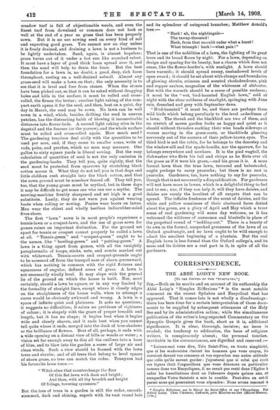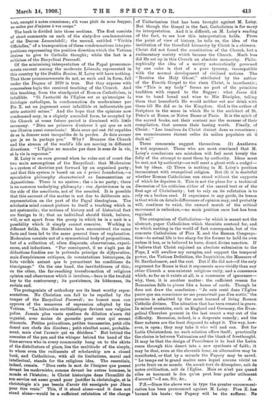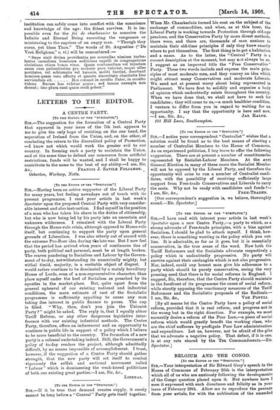CORRESPONDENCE.
THE ABBE LOISY'S NEW BOOK.
[To roe EDITOR Or THU "SexcreTon." J SIB,—Both on its merits and on account of its authorship the Abbe Loisy's "Simples Reflexions "* is the most notable comment on the recent Syllabus and Encyclical that has appeared. That it comes late is not wholly a disadvantage : there has been time for a certain interpretation of those docu- ments to be supplied by subsequent utterances of the Holy See and by its administrative action; while the simultaneous publication of the writer's long-expected Commentary on the Synoptic Gospels gives the book, short as it is, additional significance. It is clear, thorough, incisive; no issue is evaded; the tendency to edification, the bane of religious writers, is conspicuously absent; the personal touches, inevitable in the circumstances, are dignified and reserved :— "Laissez-moi vows dire, Tres Saint-Pere, en toute simplicite, que si lea modernistes itaient les hommes que vous croyez, ils auraient devant vos censures et vos reproches nue autre attitude
que cello savent garder : j'ajouterai que si celui qui ecrit ces lignes &sit l'orgueilleux que vous denoncez en particulier comma dana vos Encycliques, it ne serait pas reek dans l'Eglise A subir les humiliations dont on l'abrenve depuis quinze ans, et auxquelles Votre Saintete a mis is comble. Peut-etre en est-il parmi nous qui pourraient vous repondre : Nous avons renonc6 A
• Simples ffeJlezions sur le Dicret du Saint-Office et sur l'Encyclique. Par. Alfred Loisy. Chez l'Auteur, Ceffonds, pen Moutier-en-Der (Haute-Marne). IS fr.]
tont, excepth it notre conscience; s'il vows plait de nous frapper, ne meles pas d'injures iL vos coups."
The book is divided into three sections. The first consists of short comments on each of the sixty-five condemnations
of the Decree Lamentabili; the second, entitled " Writes Officielles," of a transposition of these condemnations into pro- positions representing the positive direction which the Vatican desires to give to Catholic thought; while the last is a criticism of the Encyclical Pascendi.
Of the minimising interpretation of the Papal pronounce- ments current among the moderate Liberals, represented in this country by the Dublin Review, M. Loisy will have nothing. That these pronouncements do not, as such and in form, fall under the Dogma of 1870 is true. But they express with remorseless logic the received teaching of the Church. And this teaching, from the standpoint of Roman Catholicism, is infallible. "Si rautorite de 1'Eglise est ce qu'enseigne la theologie catholique, la condamnation du niodernisme par Pie X. est un jugement aussi infaillible et indiscutable que cette autorite meme." And the hope that the opinions now condemned may, in a slightly amended form, be accepted by the Church at some future period is dismissed with little ceremony. " Dien me preserve d'enlever h qui que ce soit une illusion aussi consolaute! Mais ceux qui out ate capables de se la donner sont incapables de la perdre. Je dois avouer que je ne la portage pas." Why ? Because the Church and the stream of the world's life are moving in different directions. "L'Eglise ne marche pas dans le seas de In vie, et la vie In repousse."
M. Loisy is on sure ground when he rules out of court the two main assumptions of the Encyclical: that Modernism is a system of doctrine put forward by an organised party ; and that this system is based on an a priori foundation,—a speculative philosophy characterised as Imrnanentism or Agnosticism. There is no system ; the e is no party ; there is no common underlying philosophy : the Apriorismus is on the aide of the assailants, not of the assailed. It is possible that this account of the matter is not due to deliberate mis- representation on the part of the Papal theologians. The scholastic mind cannot picture to itself a teaching which is not systematic; the notions of history and of historical fact are foreign to it ; that an individual should think, believe, will, or act apart from the group in which he is a unit is a possibility which it simply cannot conceive. Working in different fields, the Modernists have encountered the same facts and been led to the same general lines of explanation. Modernism consists not of a symmetrical body of propositions, but of a collection of, often disparate, observations, experi- ences, and inductions. "Par consequent, it ne s'agit pas de deductions fondees sur le pretendu principe de &figuration, mais d'experiences critiques, de constatations historiques, de faits verifies autant que le permettent lea conditions du temoignage." On the one band, the inevitableness of this; on the other, the far-reaching transformation of religious opinion and observance which it involves,—here is the twofold key to the controversy ; its persistence, its bitterness, its certain end.
The protagonists of orthodoxy are its least worthy repre- sentatives. No Christian can fail to be repelled by the temper of the Encyclical Pascendi; no honest man can approve of the measures of repression adopted by the Vatican. "La hierarchie ecclesiastique devient tine vnlgaire police. Jamais plus vaste systeme de deletion n'aura ate organise, avec moins de garantie pour ceux qui seront denonces. Petites precautions, petites tracasseries, petit role donne aux chefs des dioceses ; petit resultat aussi, probable- ment, male c'est l'avenir qui en deciders." But behind the assassins of the pen and the whisper behind the hand of the time-servers who in every community hang on to the skirts of the distributors of place, lies the multitude of the simple, to whom even the rudiments of scholarship are a closed book, and Catholicism, with all its limitations, moral and intellectual, stands for the religious idea. The essentials, indeed, remain. "Dieu mete le mot de renigme que posent devant les modernistes, comme devant lea autres hommes, le monde et rhistoire; le Christ historique dans rhumilite de son service est assez grand pour justifier la christologie, et In christologie n'a pas besoin d'avoir etc enseignee par Jesus pour etre vraie." This, if it stood alone—and it does not stand alone—would be a sufficient refutation of the charge
of Unitarianism that has been brought against M. Loisy. But though the Gospel is the fact, Catholicism is for many its interpretation. And it is difficult, on M. Loisy's reading of the fact, to see how this interpretation holds. From the point of view of history, he tells us, the idea of the institution of the threefold hierarchy by Christ is a chimera. Christ did not found the constitution of the Church, but a rudimentary society which became the Church. Much less did He set up in this Church an absolute monarchy. Philo- sophically the idea of a society autocratically governed by one ruler is that of a pure tyranny, incompatible with the normal development of civilised nations. The "Receive the Holy Ghost," attributed by the author of the Fourth Gospel to the risen Christ, is inauthentic; the "This is my body" forms no part of the primitive tradition with regard to the Supper : what Jesus did was to hand bread and wine to His Disciples, telling them that henceforth He would neither eat nor drink with them till He did so in the Kingdom. God is the author of Scripture in the sense in which He is the architect of St. Peter's at Rome, or Notre Dame at Paris. It is the spirit of the sacred books, not their content nor the manner of their compilation, that assures their lasting worth. Finally, of Christ : " Les lumieres du Christ etaient dans sa conscience ; sea connaissances etaient celles du milieu populaire ou it etait ne."
Three comments suggest themselves. (1) Anathema is not argument. Those who are most convinced that M. Loisy's conclusions are mistaken will feel most keenly the folly of the attempt to meet them by authority. Ideas must be met, not by authority—as well meet a ghost with a cudgel—. but by ideas.. (2) There is nothing in M. Loisy's position inconsistent with evangelical religion. But (3) it is doubtful whether Roman Catholicism can stand without the supports of which he deprives it. This is not the place for a technical discussion of his criticism either of the sacred text or of the first age of Christianity ; but to rely on its refutation is to rely on a broken reed. If experience is any guide, its lesson is that while on details differences of opinion may, and probably will, continue to exist, the onward march of the critical movement is unbroken,—no main position once lost has been regained.
The antagonism of Catholicism—by which is meant not the abstract, paper Catholicism which theorists contend for, and to which nothing in the world of fact corresponds, but of the concrete Catholicism of Pius X. and the Roman Congrega- tion—to actual life is too sharp for the former to hold its own unless it has, or is believed to have, direct divine sanction. If I believe that Christ enjoined an absolute submission to the Pope, I will swallow my scruples, and support the temporal power, the Vatican Definition, the Inquisition, the Massacre of St. Bartholomew, and the rest. But if He did not—if the only argument for Rome is that it represents more vividly than any other Church a non-existent religious unity, and a consensus which, so far as it exists at all, is a consensus of ignorance— why, then, it is another matter : the sufficient reason for Romanism falls to pieces like a house of cards. Though he does not draw the conclusion : " Je suis rests dans l'Eglise parce que ma conscience ne me prescrivait pas d'en sortir," the premiss is admitted by the most learned of living Roman Catholic divines. The situation that has been created is grave. In mixed countries, such as England and Germany, the Evan- gelical Churches present in the last resort a way out of the difficulty. Secession, indeed, is a desperate remedy ; and the finer natures are the least disposed to adopt it. The way, how- ever, is open; they may take it who will and can. But for Latin Christendom no such solution offers itself; practically the choice is between Vaticanism and the blank of freethought. It may be that the design of Providence is to lead the Latin races through this desert into a new synthesis of faith ; it may be that, even at the eleventh hour, an alternative may be manifested, or that by a miracle the Papacy may be saved. " Le temps est le grand maitre sans lequel aucune verite ne porte fruit en ce monde. On await tort de desesperer, soit de notre civilisation, soit de rEglise. Mais ce n'est pas quand elles se tournent le dos qu'on peut leur parler utilement
d'accord."—I am, Sir, &c., A. P.S.—Since the above was in type the greater excommuni- cation has been pronounced against M. Loisy. Pius X..has burned his boats : the Papacy will be the sufferer. No
institution can safely come into conflict with the conscience and knowledge of the age : the fittest survives. It is im- possible even for the foi de charbonnier to conceive the Infinite and Eternal Being executing the vengeance or ministering to the caprices of an angry man. " Though they curse, yet bless Thou." The words of St. Augustine (" De
Vera Religione," o. vi.) will be remembered :-
" Srepe sinit divina providentia per nonnullas nimium turbu- lentas carnalium hominum seditiones expelli de congregations christiana, etiam bonos viros. Quam contumeliam vel injuriam snam cum patientissime pro ecclesice pace tulerint, neque ullas novitates, vel schismatis vel lueresis, moliti fuerint, docebunt homines quam vero affectu et quanta sinceritate charitatis Deo
serviendum sit Hos coronet in occulto Pater, in occulto videns. Rarum hoc videtur genus ; sed tamen exempla non desunt ; imo plura aunt quam credi potest."












































 Previous page
Previous page